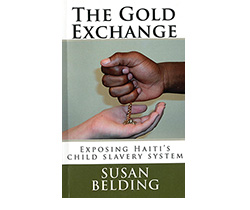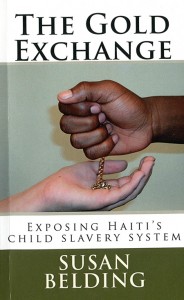
 copyright the Chronicle February 11, 2015
copyright the Chronicle February 11, 2015
Reviewed by Tena Starr
The Gold Exchange, Exposing Haiti’s Child Slavery System, by Susan Belding. Paperback. 273 pages. Published by Willoughby Gap Press. $8.14 on Amazon.
Susan Belding (who many of you would know as Susan Ferland) is a former Lake Region Union High School English teacher. She now lives in Florida, where until last month, she continued to teach, although to a quite different student body than the Northeast Kingdom’s. Many of her students have been Haitian, and those students inspired her to write The Gold Exchange, a young adult, coming of age novel that takes a look at Haiti’s deplorable restavek system.
In Haiti, generally considered among the poorest countries in the world with 80 percent unemployment, destitute — and desperate — parents might give their children to families that are better off. There’s little that’s philanthropic about the arrangement, however.
The children, often very young, essentially become slaves. Ironic in a country that was taken over in the early 1800s by revolting slaves.
The restaveks haul water for their host family, clean bedpans, serve meals, and do other labor intensive work in a land where modern basics such as indoor plumbing and electricity are not common. In exchange, the children are clothed and fed enough to keep them alive. They are not considered part of the family. They are restavek, property.
The Restavek Freedom Foundation estimates that in Haiti today there are about 300,000 such children, despite the fact that the restavek system has been illegal since 2007.
Danny White, the protagonist in this novel, is a 13-year-old about to enter high school in Naples, Florida. He’s solidly middle class, wants for nothing — except, perhaps, an extended trip to Disney World. The tickets that he hopes will satisfy that goal are not what’s in the envelope on the Christmas tree, however. Instead, that envelope holds a letter from his parents saying they are going to spend six months in Haiti volunteering their time teaching Haitian children. And Danny is, of course, going with them.
To say that Danny isn’t as enthusiastic about this adventure as his parents are would be a serious understatement. In fact, he pulls a classic teen hissy fit, cold-shouldering his parents.
But in the end he finds himself on a plane looking down on Port au Prince, astounded by the squalor.
Ms. Belding opens each chapter with a grim factoid about Haiti. For instance: “Haiti is the poorest nation in the Western Hemisphere. The average income in Haiti is $250 per person.” Or, “Ninety percent of Haitians have no running water. Seventy percent have no electricity.”
Danny finds himself at a mission school, also an orphanage, run by Father X, who has set out to care for, and educate, as many children as he can manage. Danny ends up in a one-room “apartment” with his parents. There’s a flush toilet somewhere around, but it’s shared.
Dismayed, the Florida teen only wants out, not at all reassured when Father X informs him that, by Haitian standards, his accommodations are on the luxurious side.
He makes friends, however — with Rene, a boy his age who is an orphan but has a baby sister at the orphanage; with Claudette, who has serious educational aspirations and plans to get to the U.S.; and with twin boys who round out the little group.
On Danny’s first foray with his new friends the group goes to the swimming hole where they run into Brutis and his gang — wild, tough boys who live in the woods and forage as best they can for food. Brutis soundly beats Danny, whose initial reaction is both rage and fear.
But then Danny does something surprising: Once he discovers the history behind Brutis and his gang of feral boys, his main response is fascination mixed with compassion. He begins to spy on the other boy, hoping to learn more about him and how he lives.
“I turned away and followed the slightly beaten path back to the river, thinking about how a person has no choice about the family they are born into,” Danny muses. “Rich or poor? A civilized, economically developed country like the U.S. or a dirt-poor country like Haiti? Good or lousy parents? So much is out of our control. But there comes a time when we can take control. Like Brutis did; he chose to band with a bunch of other restaveks, slave children, and live in the bushes rather than submit to being treated like property. He stepped up and took action. I had to admire that and recognize the courage it would take to make such a bold decision. Brutis had no one to fall back on, no family to rescue him if things didn’t work out.”
I doubt it’s a spoiler to say that Danny learns he’s taken a lot for granted in life — food and clothing, his comfortable home, and indoor plumbing, for instance.
As for education, like plenty of middle class American kids, Danny was prone to thinking up ways to get out of going to school. We don’t value what we’re compelled to do. For his Haitian counterparts, however, education was a rare privilege.
Frankly, I knew nothing about the restaveks, so I thank Ms. Belding for remedying my ignorance with this book.
Its weakness is in Danny’s predictable, but questionably rapid and thorough, turnaround. I’ve never run across a 13-year-old who embraced the lesson being taught so quickly, or at least admitted to it.
contact Tena Starr at [email protected]
For more free articles from the Chronicle like this one, see our Reviews pages. For all the Chronicle’s stories, subscribe:
Print subscription
Annual online subscription
Short-term online subscription







